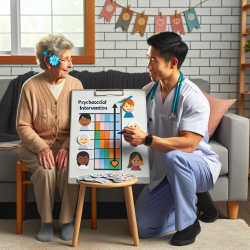Introduction
In the field of speech-language pathology, data-driven decisions and evidence-based practices are paramount. A recent study titled "Personalized goals of people living with dementia and family carers: A content analysis of goals set within an individually tailored psychosocial intervention trial" sheds light on the transformative potential of Goal Attainment Scaling (GAS) in dementia care. This blog explores how practitioners can harness these insights to improve outcomes for individuals with dementia and their carers.
The Power of Personalized Goals
Goal Attainment Scaling (GAS) is a versatile tool that captures individual priorities in personal contexts. Traditionally used in clinical settings, GAS has now been successfully applied in psychosocial interventions for people living with dementia (PLWD) and their family carers. The study conducted by Budgett et al. (2024) highlights the feasibility of using GAS to set personalized goals remotely, even during the challenging times of the COVID-19 pandemic.
Key Findings
- Nonclinical facilitators can be effectively trained to set and score GAS goals, making the approach scalable and accessible.
- Participants collaboratively set three to five goals, with a significant focus on social support and carer well-being.
- The study identified new goal domains, including carer break, carer mood, carer behavior, and carer sleep, underscoring the diverse needs of carers.
- GAS facilitates a personalized approach to care, aligning interventions with the unique priorities of PLWD and their carers.
Implementing GAS in Practice
For practitioners in speech-language pathology, incorporating GAS into practice can enhance the personalization of care plans. Here are some steps to consider:
- Training and Supervision: Ensure facilitators receive comprehensive training in GAS methodology, focusing on setting SMART (Specific, Measurable, Achievable, Relevant, Time-bound) goals.
- Collaborative Goal Setting: Engage both PLWD and their carers in the goal-setting process to capture a holistic view of their needs and priorities.
- Remote Implementation: Leverage technology to conduct goal-setting sessions remotely, ensuring accessibility and continuity of care.
- Regular Review: Continuously assess and adjust goals to reflect changes in the individual's condition and circumstances.
Encouraging Further Research
While the study provides valuable insights, further research is needed to explore the long-term impact of GAS on dementia care outcomes. Practitioners are encouraged to contribute to this growing body of knowledge by conducting studies within their own practice settings.
Conclusion
The use of Goal Attainment Scaling in dementia care represents a significant advancement in personalized care. By setting individualized goals, practitioners can better support PLWD and their carers, ultimately improving their quality of life. As we continue to explore innovative approaches in speech-language pathology, let us remain committed to data-driven decisions that lead to meaningful outcomes.
To read the original research paper, please follow this link: Personalized goals of people living with dementia and family carers: A content analysis of goals set within an individually tailored psychosocial intervention trial.










